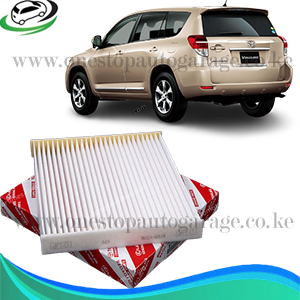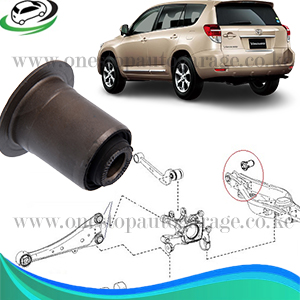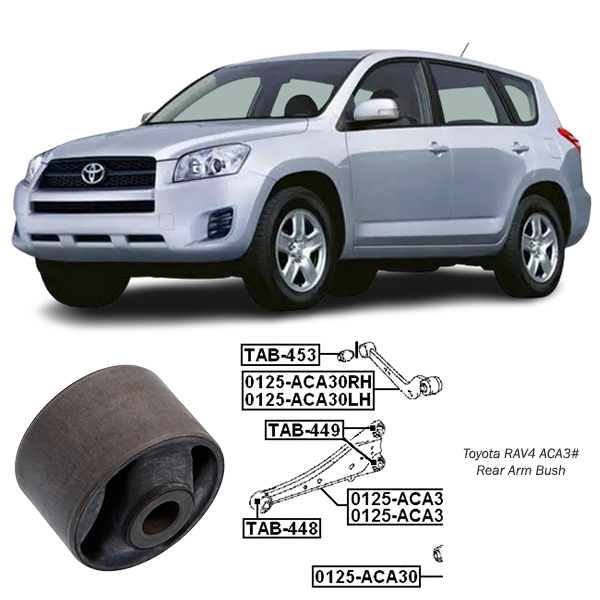-8%
Get Toyota RAV4 ACA3# Rear Control Big Arm Bush TAB-448 in Kenya
The rear control big arm bush, also known simply as the control arm bushing, plays a vital role in a vehicle’s suspension system. This component is located at the connection point between the rear control arm and the vehicle’s chassis. It acts as a flexible pivot, allowing the control arm to move smoothly while isolating the vehicle’s frame from road vibrations, impacts, and noise.
In this guide, we will explore the structure, functions, benefits, types, signs of wear, replacement procedures, and maintenance tips for rear control big arm bushes.
Structure of the Rear Control Big Arm Bush
The rear control big arm bush is a robust, cylindrical component designed to endure significant forces while providing flexibility and stability. It consists of:
- Outer Shell
- Usually made of steel or aluminum for structural strength.
- Provides a secure fit within the control arm or chassis mounting point.
- Rubber or Polyurethane Core
- Acts as the cushion, absorbing shocks and vibrations.
- The material ensures flexibility and durability under varying temperatures and conditions.
- Inner Sleeve
- Often constructed from steel, this sleeve accommodates the bolt securing the control arm to the chassis.
- Allows rotational movement while maintaining a secure connection.
Functions of the Rear Control Big Arm Bush
- Damping Vibrations
- Absorbs road shocks and vibrations, ensuring a smoother ride.
- Facilitating Suspension Movement
- Allows the rear control arm to pivot during suspension travel.
- Maintaining Alignment
- Keeps the wheels properly aligned with the road surface, aiding in vehicle stability and handling.
- Reducing Noise
- Minimizes noise transmission from the road to the vehicle cabin.
- Enhancing Durability
- Protects the suspension system by mitigating the impact of road irregularities.
Types of Rear Control Big Arm Bushes
- Rubber Bushings
- Common in most vehicles.
- Offers excellent vibration damping and noise reduction.
- Susceptible to wear over time due to environmental factors.
- Polyurethane (PU) Bushings
- More durable than rubber.
- Provides enhanced performance for sports or heavy-duty vehicles.
- Slightly less effective at damping vibrations and noise.
- Hydraulic Bushings
- Contain fluid-filled chambers to provide superior shock absorption.
- Commonly used in luxury vehicles.
- Solid Bushings
- Made of metal or hard composites.
- Used in performance-oriented vehicles where precision is critical.
Benefits of a Well-Maintained Rear Control Big Arm Bush
- Improved Ride Comfort
A properly functioning bushing absorbs road irregularities, ensuring a smoother ride. - Enhanced Vehicle Stability
Maintains suspension alignment and improves handling, especially during cornering or braking. - Reduced Wear on Suspension Components
Protects adjacent parts like the control arms, ball joints, and shocks from excessive stress. - Longer Tire Life
Prevents misalignment that can cause uneven tire wear. - Quieter Cabin Experience
Reduces noise transmission, contributing to a quieter ride.
Signs of a Worn or Damaged Rear Control Big Arm Bush
- Clunking or Knocking Sounds
Noise from the rear suspension area, particularly when driving over bumps or potholes, can indicate worn bushings. - Uneven Tire Wear
Misalignment caused by damaged bushings can result in irregular tire wear patterns. - Vibration in the Cabin
Increased vibrations felt in the vehicle interior are a common symptom of deteriorated bushings. - Poor Handling
A loose or unstable rear end during cornering or braking is a sign of worn-out bushings. - Visual Inspection
Cracks, splits, or excessive wear on the bushing’s rubber or polyurethane component are indicators of damage.
Causes of Rear Control Big Arm Bush Wear
- Aging
Rubber components naturally degrade over time due to exposure to heat, moisture, and ozone. - Environmental Factors
Exposure to dirt, road salt, oil, and other contaminants accelerates wear. - Heavy Loads
Carrying excessive weight puts additional stress on the bushings. - Aggressive Driving
Frequent hard braking, sharp cornering, or driving over rough terrain can shorten the bushing’s lifespan. - Improper Installation
Incorrectly installed bushings may wear unevenly or fail prematurely.
Maintenance Tips for Rear Control Big Arm Bushes
- Regular Inspections
- Check the bushings during routine suspension maintenance for cracks, wear, or misalignment.
- Avoid Overloading
- Keep loads within the vehicle’s recommended capacity to reduce stress on suspension components.
- Drive Carefully
- Avoid potholes and rough terrain whenever possible to minimize impact stress.
- Clean the Undercarriage
- Regularly clean the underside of the vehicle to remove dirt and contaminants that can degrade bushings.
- Use High-Quality Replacements
- Opt for OEM or high-quality aftermarket bushings during replacement.
Steps to Replace Rear Control Big Arm Bushes
Tools Needed
- Jack and jack stands.
- Wrench and socket set.
- Bushing press or appropriate removal tools.
- Replacement bushings.
Procedure
- Lift the Vehicle
- Use a jack to lift the rear of the vehicle and secure it on jack stands.
- Remove the Control Arm
- Unbolt the control arm from the chassis and suspension assembly.
- Inspect the Old Bushing
- Check the bushing for wear and confirm the need for replacement.
- Remove the Old Bushing
- Use a bushing press or specialized tool to press out the old bushing.
- Clean the Mounting Point
- Remove dirt, rust, and debris from the bushing housing to ensure a snug fit for the new component.
- Install the New Bushing
- Press the new bushing into the control arm using a bushing press. Ensure it is aligned correctly.
- Reattach the Control Arm
- Bolt the control arm back into place, following the vehicle manufacturer’s torque specifications.
- Test the Vehicle
- Lower the vehicle and take it for a test drive to ensure proper installation and performance.
Common Mistakes to Avoid During Replacement
- Using Incorrect Tools
Attempting to remove or install bushings without the proper tools can damage the control arm. - Neglecting Alignment
Failure to realign the suspension after bushing replacement can lead to poor handling. - Reusing Old Bolts
Always use new bolts if specified by the manufacturer to ensure secure mounting. - Ignoring Adjacent Components
Inspect other suspension parts for wear and replace them if necessary during the same repair session.
Why Choose High-Quality Rear Control Big Arm Bushes?
- Enhanced Durability
High-quality materials resist wear, ensuring a longer lifespan. - Superior Performance
Premium bushings improve ride comfort, stability, and handling. - Cost-Effective
Though initially more expensive, they reduce the need for frequent replacements.
Conclusion
The rear control big arm bush is a crucial component in a vehicle’s suspension system, responsible for absorbing shocks, maintaining alignment, and ensuring ride comfort. Regular maintenance, proper installation, and timely replacement of these bushings are essential for a smooth and safe driving experience. By understanding the role of this component and adhering to best practices, drivers can extend the life of their vehicle’s suspension system and enjoy enhanced performance on the road.
Follow us on Facebook for more parts.



